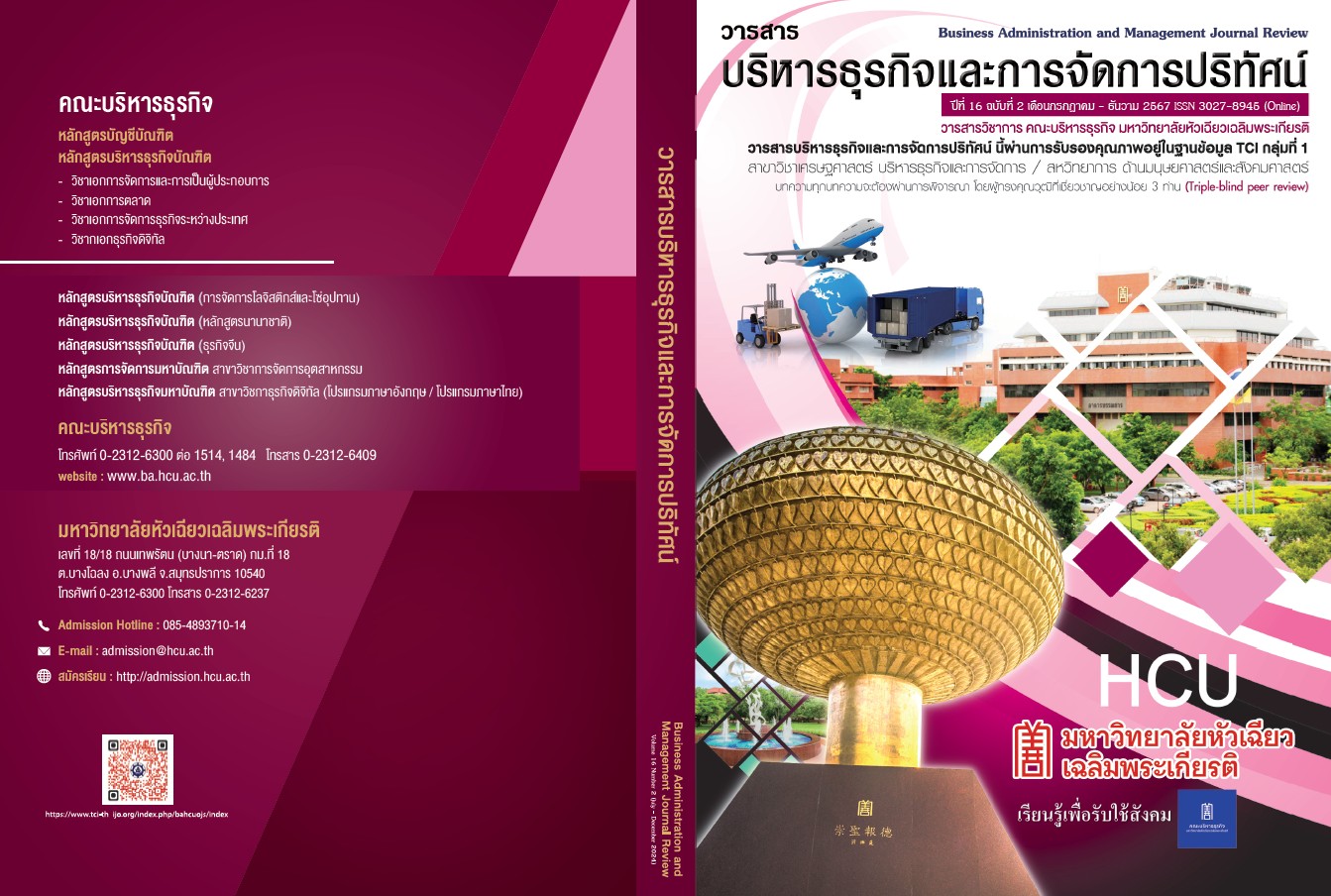The Moderating Effect of Job Satisfaction on the Relationship between Innovative Leadership, Perceived Organizational Support, and Employees’ Innovative Work Behavior
Keywords:
Innovative Leadership, Perceived Organizational Support, Innovative Work Behavior, Job SatisfactionAbstract
This research aims to 1) study the effect of innovative leadership, perceived organizational support, and job satisfaction on employees’ innovative work behavior and 2) study the role of job satisfaction as the moderator on the relationship between innovative leadership, perceived organizational support, and employees’ innovative work behavior. In this study, hierarchical multiple regression analyses were used to test the research hypotheses in quantitative research. The data were collected using a questionnaire from 358 employees of a private organization in the cement-building materials business in Thailand by using simple randomization method.
The results of this study show that 1) innovative leadership, perceived organizational support, and job satisfaction positively influences on employees’ innovative work behavior and 2) job satisfaction moderates the relationship between innovative leadership, perceived organizational support and employees’ innovative work behavior
References
ธานินทร์ ศิลป์จารุ. (2563). การวิจัยและวิเคราะห์ข้อมูลทางสถิติด้วย SPSS และ AMOS (พิมพ์ครั้งที่ 18). กรุงเทพฯ: เอส. อาร์. พริ้นติ้ง แมสโปรดักส์.
ประเวช ชุ่มเกษตรกูลกิจ และศจีมาจ ณ วิเชียร. (2561). พฤติกรรมสร้างนวัตกรรมในการทำงาน: แนวคิด ปัจจัยเชิงสาเหตุ ความท้าทาย. วารสารพฤติกรรมศาสตร์เพื่อการพัฒนา, 10(1), 22-41. https://so02.tci-thaijo.org/index.php/JBSD/article/view/110682
ปานชนก โชติวิวัฒน์กุล และวิโรจน์ เจษฎาลักษณ์. (2562). ความสัมพันธ์ระหว่างการรับรู้การสนับสนุนจากองค์กร การรับรู้ความยุติธรรมในองค์กร และความผูกพันต่อองค์กรของพนักงานโรงพยาบาลเอกชน. วารสารชุมชนวิจัย, 13(1), 154-166. https://doi.org/10.14456/10.14456/nrru-rdi.2019.12
ปิยรัตน์ วงศ์ทองเหลือ. (2560). ปัจจัยที่มีอิทธิพลและแนวทางการเสริมสร้างพฤติกรรมการทํางานเชิงนวัตกรรม ของพนักงานอุตสาหกรรมอาหารขนาดกลางและขนาดย่อม: การวิจัยผสานวิธี [วิทยานิพนธ์ปริญญาดุษฎีบัณฑิต, มหาวิทยาลัยศรีนครินทรวิโรฒ]. Central Library Srinakharinwirot University. http://search.swu.ac.th/primoexplore/fulldisplay?docid=ALEPH_MONO000429984&context=L&vid=SWU&lang=en_US&search_scope=library_catalog&adaptor=LocalSearch Engine&tab=default_tab&query=any,contains,ปิยรัตน์ วงศ์ทองเหลือ&offset=0
ปิลันธนา แป้นปลื้ม. (2560). อิทธิพลของความยุติธรรมในองค์การต่อผลการปฏิบัติงานตามบทบาทหน้าที่ผ่านการรับรู้การสนับสนุนจากองค์การ. วารสารอิเล็กทรอนิกส์การเรียนรู้ทางไกลเชิงนวัตกรรม, 7(1), 55-67. https://so01.tci-thaijo.org/index.php/e-jodil/article/view/238881
วิชัย อุตสาหจิต. (2562). ภาวะผู้นำ นำตนก่อนนำคนอื่น: สภาวะผู้นำที่จริงแท้. กรุงเทพฯ: บริษัท ไซเบอร์ พริ้นท์กรุ๊ป จำกัด.
วิโรจน์ เจษฎาลักษณ์. (2553). ความสัมพันธ์ระหว่างความยุติธรรมด้านผลลัพธ์และด้านกระบวนการกับพฤติกรรมการเป็นสมาชิกที่ดีต่อองค์กร และผลการปฏิบัติงานตามบทบาทหน้าที่ ผ่านการรับรู้การสนับสนุนจากองค์กร. วารสารมหาวิทยาลัยศิลปากร, 30(2), 65-81. https://so05.tci-thaijo.org/index.php/sujthai/article/view/7180
สำนักงานนวัตกรรมแห่งชาติ. (2563). 10th Year NIA: Toward Innovation Nation. สมุทรสาคร: พิมพ์ดี.
สุวิมล ติรกานันท์. (2555). การวิเคราะห์ตัวแปรพหุในงานวิจัยทางสังคมศาสตร์ (พิมพ์ครั้งที่ 2). กรุงเทพฯ: โรงพิมพ์แห่งจุฬาลงกรณ์มหาวิทยาลัย.
องค์อร ประจันเขตต์ และสุชาดา นันทะไชย. (2557). โมเดลสมการโครงสร้างเชิงเส้นของพฤติกรรมการทำงานที่มุ่งนวัตกรรมของอาจารย์พยาบาลในสถาบันสมทบคณะพยาบาลศาสตร์ มหาวิทยาลัยมหิดล. วารสารพยาบาลทหารบก, 15(3), 371-381. https://he01.tci-thaijo.org/index.php/JRTAN/article/view/31177
อภิรักษ์ บุปผาชื่น. (2563). ภาวะผู้นำเชิงนวัตกรรม: การขับเคลื่อนองค์การสู่ความเป็นเลิศ. วารสารนวัตกรรมการศึกษาและการวิจัย, 4(3), 205-216. https://so03.tci-thaijo.org/index.php/jeir/article/view/247139
อรวรางค์ จันทร์เกษม. (2556). ความสัมพันธ์ระหว่างปัจจัยส่วนบุคคล ภาวะผู้นำเชิงนวัตกรรมของผู้บริหารตามความคิดเห็นของพนักงานและพฤติกรรมมุ่งผลสัมฤทธิ์ในการทำงานของพนักงานในอุตสาหกรรมการผลิต [วิทยานิพนธ์ปริญญามหาบัณฑิต, มหาวิทยาลัยเทคโนโลยีพระจอมเกล้าพระนครเหนือ]. KMUTNB Digital Library. https://injan.kmutnb.ac.th/search~S0/?searchtype=X&searcharg=อรวรางค์ จันทร์เกษม. (2556).
Baron, R. M., & Kenny, D. A. (1986). The moderator–mediator variable distinction in social psychological research: Conceptual, strategic, and statistical considerations. Journal of Personality and Social Psychology, 51(6), 1173-1182. doi:10.1037/0022-3514.51.6.1173
BrandAge Online. (2565, 24 พฤศจิกายน). SCG รับ 9 รางวัลความเป็นเลิศด้านบริหารจัดการองค์กร โดดเด่นด้านผู้นำ ทรัพยากรบุคคล 20 ปีซ้อน. https://brandage.com/article/33445
De Jong, J., & Den Hartog, D. (2010). Measuring innovative work behavior. Creativity and Innovation Management, 19(1), 23-36. https://doi.org/10.1111/j.1467-8691.2010.00547.x
Demircioglu, M. A. (2021). Sources of innovation, autonomy, and employee job satisfaction in public organizations. Public Performance & Management Review, 44(1), 155-186. https://doi.org/10.1080/15309576.2020.1820350
Eisenberger, R., Huntington, R., Hutchison, S., & Sowa, D. (1986). Perceived organizational support. Journal of Applied Psychology, 71(3), 500-507. https://doi.org/10.1037/0021-9010.71.3.500
Elidemir, S. N., Ozturen, A., & Bayighomog, S. W. (2020). Innovative behaviors, employee creativity, and sustainable competitive advantage: A moderated mediation. Sustainability, 12(8). https://doi.org/10.3390/su12083295
Herzberg, F. (1976). The managerial choice: To be efficient and to be human. Homewood, IL: Dow Jones-Irwin.
HR NOTE.asia. (2565, 25 ตุลาคม). ความพึงพอใจของพนักงาน (Employee Satisfaction) สำคัญต่อองค์กรขนาดไหน. https://th.hrnote.asia/personnel-management/190724-employee-satifaction/
Kara, K., & Yücekaya, P. (2021). The mediating role of job satisfaction between perceived organizational support and organizational commitment. Focus on Research in Contemporary Economics, 2(1), 64-85. https://orcid.org/0000-0002-1359-0244
Krejcie, R. V., & Morgan, D. W. (1970). Determining sample size for research activities. Educational and Psychological Measurement, 30(3), 607-610. https://doi.org/10.1177/001316447003000308
Macdonald, S., & Maclntyre, P. (1997). The generic job satisfaction scale: Scale development and its correlates. Employee Assistance Quarterly, 13(2), 1-16. https://doi.org/10.1300/J022v13n02_01
Maneesriwongul, W., & Dixon, J. K. (2004). Instrument translation process: A methods review. Journal of Advanced Nursing, 48(2), 175-186. https://doi.org/10.1111/j.1365-2648.2004.03185.x
Maslow, A. H. (1954). Motivation and personality. New York: Harper & Row.
Mustafa, M., Coetzer, A., Ramos, H. M., & Fuhrer, J. (2021). Exploring the effects of small-and medium-sized enterprise employees’ job satisfaction on their innovative work behaviours: The moderating effects of personality. Journal of Organizational Effectiveness: People and Performance, 8(2), 228-250. https://doi.org/10.1108/JOEPP-07-2020-0133
Riggio, R. E. (2018). Introduction to industrial/organizational psychology (7th ed.). New York: Routledge, Taylor & Francis Group.
Scandura, T. A., Graen, G. B., & Novak, M. A. (1986). When managers decide not to decide autocratically: An investigation of leader–member exchange and decision influence. Journal of Applied Psychology, 71(4), 579-584. https://doi.org/10.1037/0021-9010.71.4.579
SCG. (ม.ป.ป.). รู้จักเอสซีจี: วิสัยทัศน์ เอสซีจี. https://www.scg.com/th/01corporate_profile/02_scg_vision_03.html
Si Dah, N., Siripipatthanakul, S., Phayaphrom, B., & Limna, P. (2022). Determinants of employee innovation: A case of NGOs and CSOs in Mae Sot, Thai-Myanmar border. International Journal of Behavioral Analytics, 2(1), 1-15. https://ssrn.com/abstract=4015732
Spector, P. E. (1997). Job satisfaction application, assessment, causes, and consequences. USA: Sage Publications.
Downloads
Published
How to Cite
Issue
Section
License
Copyright (c) 2024 Business Administration and Management Journal Review

This work is licensed under a Creative Commons Attribution-NonCommercial-NoDerivatives 4.0 International License.
All articles published in the Business Administration and Management Journal Review are copyrighted by the journal.
The views and opinions expressed in each article are solely those of the individual authors and do not represent those of Huachiew Chalermprakiet University or any other faculty members. Each author is fully responsible for the content of their own article. Any errors or issues found are the sole responsibility of the respective author.




